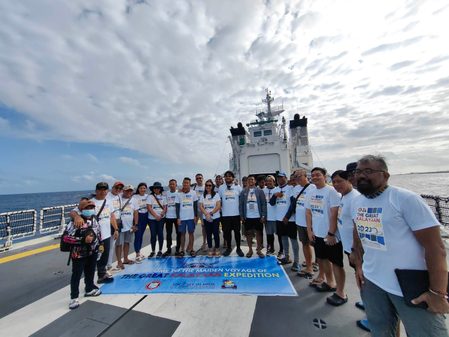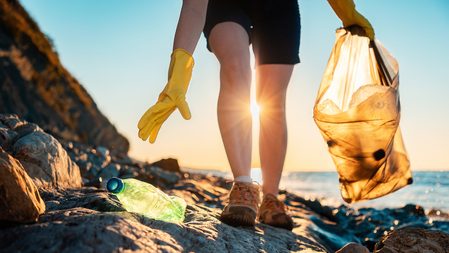SUMMARY
This is AI generated summarization, which may have errors. For context, always refer to the full article.
![[OPINION] Embracing the Philippine archipelagic identity](https://www.rappler.com/tachyon/2023/11/imho.jpg)
The Philippines is the second largest archipelago in the world. Its maritime territory is larger than its land area. It is also at the heart of the Coral Triangle, an area in Southeast Asia and the Pacific Islands described as the center of global marine biodiversity. Approximately 62% of Filipinos live along the coasts. These geographic advantages shaped our culture, way of life, and national identity.
Our connection with the sea dates back to the pre-colonial era. The discovery of balangay boats and maritime artifacts demonstrates our ancestors’ knowledge of sophisticated shipbuilding practices that enabled them to conduct maritime commerce and navigate the islands. These ties to the seas paved the way for diverse customs and traditions, which influenced the nation’s culture.
The influence of the seas on our national identity is evident in arts, literature, and pop culture. For instance, folklore depicts the bakunawa, a sea serpent deity believed to swallow the moon leading to eclipses. National Artist Fernando Amorsolo’s painting, Fisherman at Sunset, is believed to portray Filipino fishermen as embodiments of determination. Jose Rizal, in “Mi Ultimo Adios,” expressed his adoration for the Philippines by referring to it as the “Pearl of the Orient Seas.” Additionally, Manila took its name from the mangrove species nilad. In pop culture, Mars Ravelo’s Dyesebel has made an indelible mark in comics, film, and television.
Drifting away from the sea
Despite the Philippines’ deep connection to the ocean, Filipinos have yet to fully embrace the archipelagic identity essential to fully realizing the nation’s vast maritime potential. Filipinos’ low swimming abilities, the country’s poor maritime safety records resulting in numerous casualties, and misconceptions leading to fear of marine animals, created a sense of apprehension towards the sea. As a nation, the country has historically prioritized land-focused development over maximizing the sustainable utility of our maritime resources. This is partly due to the absence of an overarching maritime economy development plan and the lack of a comprehensive legal framework to govern our maritime zones, which has hindered the realization of the full potential of our maritime heritage.
The seas are crucial to our nation’s survival
Despite these barriers, our seas continue to sustain the nation and its people. The Philippines relies on fisheries for livelihood making the fishing sector the top contributor to the country’s ocean economy. The seas also serve as channels for trade. In 2022, domestic and international trade values reached P845.50 billion and $216.2 billion, respectively, and most of these trades were through the seas. In 2021, the maritime sector alone employed 1.9 million Filipinos, or 4.5% of the country’s labor force. These economic benefits barely scratch the estimated value of marine ecosystems at $1.5 trillion.
With these benefits in mind, the country must create policies and legal frameworks to improve maritime governance and help strengthen the blue economy. The blue economy, or the sustainable use of maritime resources to drive economic growth, is one of the keys to harnessing the true potential of our maritime domain. For instance, protecting marine ecosystems such as coral reefs and mangrove forests improves food access, and protects communities from climate change-related hazards.
However, we are at risk of losing these benefits due to various threats affecting our seas and all Filipinos. Illegal fishing and marine pollution degrades the environment, putting millions of livelihoods at risk. Smuggling in ports undermines fair trade and inhibits the state’s capacity to protect its resources. Piracy, terrorism, and human trafficking at sea trample upon Filipinos’ human rights. Lastly, foreign incursions in disputed parts of our territorial seas prevent us from maximizing maritime resources.
Protecting our seas by embracing our archipelagic identity
Addressing these threats requires us to deepen our connection to our seas. Embracing our archipelagic identity means valuing our rich marine resources and taking concrete actions to protect our seas. On an individual level, reducing reliance on disposables where possible can significantly reduce the waste that could pollute our seas. Various organizations and local governments have also embraced their archipelagic identity by conserving and protecting marine ecosystems through the establishment of marine protected areas, supporting sustainable seafood sources, and promoting sustainable tourism practices.
A growing number of Filipinos are also putting the country’s national interest in mind. A recent survey revealed that 70% of Filipinos want the government to assert their rights to disputed seas. Legislators also filed the Maritime Zones Bill; if passed, it will establish a clear and comprehensive legal framework for governing maritime resources, aligned with the United Nations Convention on the Law of the Sea, to which the Philippines is a party.
Our seas may have geographically divided the nation, but they also connected the Filipino people. Leveraging our archipelagic identity is crucial in safeguarding our way of life, and fully realizing the Philippines’ maritime potential. – Rappler.com
Harvey Perello is the Project Manager of Save Philippine Seas and a communications adviser for Project Waypoints. He is an environmentalist advocating for healthy oceans and climate change adaptation and mitigation in the Philippines.
Add a comment
How does this make you feel?


There are no comments yet. Add your comment to start the conversation.